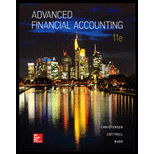
Advanced Financial Accounting
11th Edition
ISBN: 9780078025877
Author: Theodore E. Christensen, David M Cottrell, Cassy JH Budd Advanced Financial Accounting
Publisher: McGraw-Hill Education
expand_more
expand_more
format_list_bulleted
Concept explainers
Textbook Question
Chapter 10, Problem 10.16Q
How does the use of interperiod tax allocation procedures affect the amount of income assigned to noncontrolling shareholders inn the period in which the subsidiary records unrealized intercompany profits?
Expert Solution & Answer
Want to see the full answer?
Check out a sample textbook solution
Students have asked these similar questions
Opereting cash flow if the tax rate in 34 percent?
Manufacturing overhead is applied based on budgeted direct labor hours. The direct labor budget indicates that 6,200 direct labor hours will be required during the year. The variable overhead rate is $4.10 per direct labor hour. The company's budgeted fixed manufacturing overhead is $92,500 per year, which includes depreciation of $18,400. All other fixed manufacturing overhead costs represent current cash flows. The predetermined overhead rate would be_.help
Manufacturing overhead is applied based on budgeted direct labor hours. The direct labor budget indicates that 6,200 direct labor hours will be required during the year. The variable overhead rate is $4.10 per direct labor hour. The company's budgeted fixed manufacturing overhead is $92,500 per year, which includes depreciation of $18,400. All other fixed manufacturing overhead costs represent current cash flows. The predetermined overhead rate would be_.
Chapter 10 Solutions
Advanced Financial Accounting
Ch. 10 - Prob. 10.1QCh. 10 - Why are dividend payments to noncontrolling...Ch. 10 - Prob. 10.3QCh. 10 - Why are changes in inventory balances not shown in...Ch. 10 - Prob. 10.5QCh. 10 - How is an increase in inventory included in the...Ch. 10 - What portion of the sales of an acquired company...Ch. 10 - Prob. 10.8QCh. 10 - Prob. 10.9QCh. 10 - Prob. 10.10Q
Ch. 10 - Prob. 10.11QCh. 10 - Prob. 10.12QCh. 10 - Prob. 10.13QCh. 10 - Prob. 10.14QCh. 10 - How do interperiod income tax allocation...Ch. 10 - How does the use of interperiod tax allocation...Ch. 10 - Prob. 10.17QCh. 10 - Prob. 10.18QCh. 10 - Prob. 10.19QCh. 10 - When a subsidiary’s convertible bond is treated as...Ch. 10 - Prob. 10.21QCh. 10 - What effect does the presence of a noncontrolling...Ch. 10 - Prob. 10.3CCh. 10 - Consolidated Cash Flows Analysis The consolidated...Ch. 10 - Prob. 10.1ECh. 10 - Prob. 10.2ECh. 10 - Prob. 10.3ECh. 10 - Prob. 10.4ECh. 10 - Prob. 10.5ECh. 10 - Direct Method Cash Flow Statement Using the data...Ch. 10 - Prob. 10.7ECh. 10 - Prob. 10.8ECh. 10 - Prob. 10.9ECh. 10 - Prob. 10.10ECh. 10 - Prob. 10.11ECh. 10 - Prob. 10.12ECh. 10 - Prob. 10.13ECh. 10 - Prob. 10.14ECh. 10 - Prob. 10.15ECh. 10 - Effect of Convertible Preferred Stock on Earnings...Ch. 10 - Prob. 10.17PCh. 10 - Prob. 10.18PCh. 10 - Prob. 10.19PCh. 10 - Prob. 10.20PCh. 10 - Prob. 10.21PCh. 10 - Prob. 10.22PCh. 10 - Prob. 10.23PCh. 10 - Prob. 10.24PCh. 10 - Prob. 10.25PCh. 10 - Prob. 10.26PCh. 10 - Prob. 10.27PCh. 10 - Prob. 10.29PCh. 10 - Prob. 10.30PCh. 10 - Prob. 10.31PCh. 10 - Earnings per Share with Convertible Securities...Ch. 10 - Comprehensive Earnings per Share Mighty...
Knowledge Booster
Learn more about
Need a deep-dive on the concept behind this application? Look no further. Learn more about this topic, accounting and related others by exploring similar questions and additional content below.Similar questions
- As part of your Portfolio Project due in Module 8, your job is to identify new opportunities for your company. Describe the company and the products and services created by this company. Part of your employment responsibility includes completing the following two reports to support your recommendation for an international expansion: Conduct a Market Intelligence Assessment: This is a broad overview of the target country. The overview should include information about its political, legal, cultural, economic, and technological characteristics. Provide supporting statistics and indicators for each component of the macroenvironment. Conduct a Business Environment Analysis: To do so, determine key national characteristics that will affect the marketing of the product. Comment on any potential ethical implications.arrow_forwardFinancial accountingarrow_forwardWhat is the effective after tax interest expense for the firm of this financial accounting question?arrow_forward
arrow_back_ios
SEE MORE QUESTIONS
arrow_forward_ios
Recommended textbooks for you
 Intermediate Accounting: Reporting And AnalysisAccountingISBN:9781337788281Author:James M. Wahlen, Jefferson P. Jones, Donald PagachPublisher:Cengage Learning
Intermediate Accounting: Reporting And AnalysisAccountingISBN:9781337788281Author:James M. Wahlen, Jefferson P. Jones, Donald PagachPublisher:Cengage Learning EBK CONTEMPORARY FINANCIAL MANAGEMENTFinanceISBN:9781337514835Author:MOYERPublisher:CENGAGE LEARNING - CONSIGNMENT
EBK CONTEMPORARY FINANCIAL MANAGEMENTFinanceISBN:9781337514835Author:MOYERPublisher:CENGAGE LEARNING - CONSIGNMENT


Intermediate Accounting: Reporting And Analysis
Accounting
ISBN:9781337788281
Author:James M. Wahlen, Jefferson P. Jones, Donald Pagach
Publisher:Cengage Learning


EBK CONTEMPORARY FINANCIAL MANAGEMENT
Finance
ISBN:9781337514835
Author:MOYER
Publisher:CENGAGE LEARNING - CONSIGNMENT


Understanding U.S. Taxes; Author: Bechtel International Center/Stanford University;https://www.youtube.com/watch?v=QFrw0y08Oto;License: Standard Youtube License